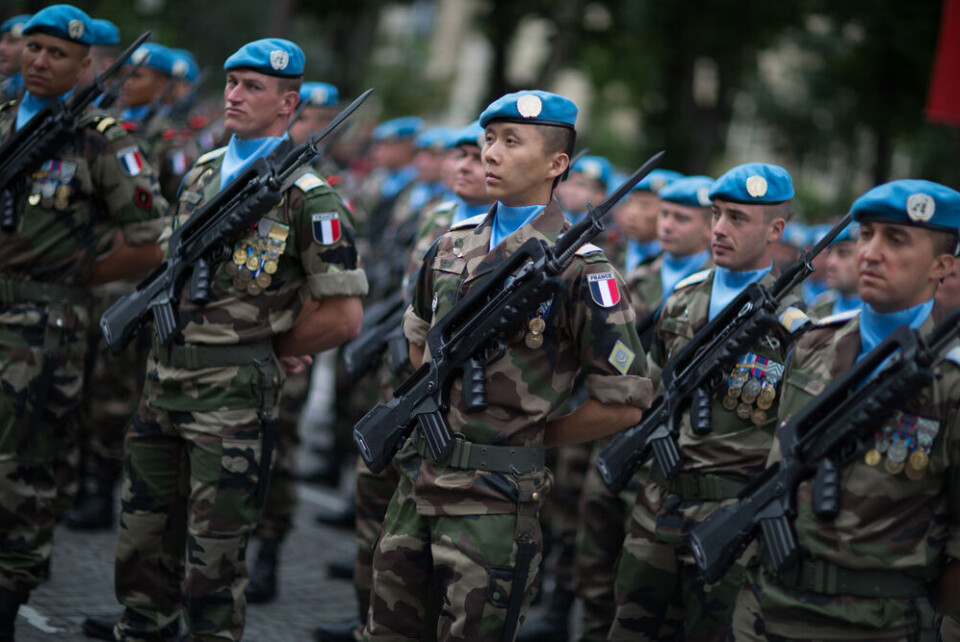-
Flood and avalanche warnings in place as storm Hans hits south-east France
Up to 200mm of rain is expected this week along with two metres of snow in Alpine areas
-
QR code to replace paper instructions for 100 medicines in France in new trial
Paracetamol and cholesterol medication to be included in scheme that launches this autumn
-
Online ‘anti-waste’ supermarket offers deals on everyday items in France - we test it
Discounts of 10% to 50% available on brand products
14 Foreign Legion soldiers stopped in Paris on way to Ukraine
It is not yet clear if the Ukrainians were travelling to fight or to help their families. Nine of them did not have permission to leave the country and another four were already considered ‘missing’

French police have arrested 14 Ukrainian Foreign Legion soldiers as they travelled on a bus to Poland with other passengers, appearing as though they were preparing to fight in Ukraine.
The bus was stopped yesterday (March 2) in Paris.
Nine of the 14 foreign legion soldiers did not have permission to leave the country. The five others were found to have “irregular status”, of which four were already considered to have been “missing”, Foreign Legion Commander Alain Lardet told the AFP.
It could not be immediately established if the Foreign Legion soldiers were going to fight in Ukraine, or simply wanted to help their families who have fled the country. None of the 14 had any weapons or prohibited equipment in their luggage.
In contrast, some other passengers on the bus, who were civilians, did reportedly have items in their luggage that suggested they were travelling to fight.
What is the Foreign Legion?
The Foreign Legion is a unit of the French army, with more than 9,000 men. It was created in 1831 to enable the incorporation of foreign soldiers into the French Army.
It can be joined by recruits aged 17 to 39 from all over the world and all new recruits get a new identity.
After several years, or if the soldiers “shed blood” in combat, the "képis blancs", as they are known, can become French.
It has several subdivisions: infantry, cavalry, engineers and airborne troops, and is independent in terms of recruitment.
There are currently 710 soldiers of Ukrainian origin in the Legion, of which 210 have already been granted French citizenship. There are 450 of Russian origin.
Permissions granted
There has been “no community tension”, General Lardet said, but he added that there has been “major anxiety among the Ukrainians, who are worried for their families”, since the start of the Russian offensive.
The Legion has offered Ukrainians who request it “exceptional 15-day permission” to travel to a country on the border with Ukraine, to “welcome” and “secure” their families and loved ones, but they are not allowed to cross the border into Ukraine itself.
In a video published online on Tuesday (March 1), General Lardet announced the authorisation for soldiers wishing to “facilitate the safety of families fleeing the conflict”.
He said: “We ask a lot of soldiers, including to die - that's the job. But you cannot ask him to cheat, to disappoint, to contradict, to lie, to deny himself or to perjure himself…
“...All legionnaires concerned by this conflict will be able to ask the Foreign Legion to help them to welcome their families in an emergency, in accordance with the law applicable in France, in particular, according to…directives relating to…refugees.
“The Legion will work…to the extent of its ability and according to its priorities, to provide material or administrative assistance.”
The Legion has also set up a “listening cell” to “best respond to [soldiers’] needs,” he said.
He added: "I sympathise with your inner turmoil. Your homeland is bleeding and suffering. Your families have been hit by this war. For those few who are tempted to run to where the fire is raging…Do not perjure yourselves.
“For yourself and for the Legion, maintain your service with honour and faithfulness. Who knows if tomorrow your unit will not be engaged. Where will you be? Your partner, brother in arms, will miss you, as will every legionnaire.”
On Tuesday, 25 of these two-week permissions were granted and “many others” were on Wednesday (March 2).
However, nine of those arrested on the bus in Paris only had “regular permission” to travel, which restricts them to movement within mainland France. However, they will not be sanctioned, the general said, because the rules of the permission appear to have been “badly communicated” to them.
The five others arrested committed a “heavy offence against the Legionnaires’ code of honour” and “will be sanctioned”, General Lardet added.
A total of 25 Ukrainian Foreign Legion soldiers have deserted in the past week, of which at least half are thought to have gone to fight against Russia.
Related articles
Can you avoid prison by joining French Foreign Legion?
US soldier jailed for joining Legion
Coming days will be harder, Macron tells France in Ukraine speech
























